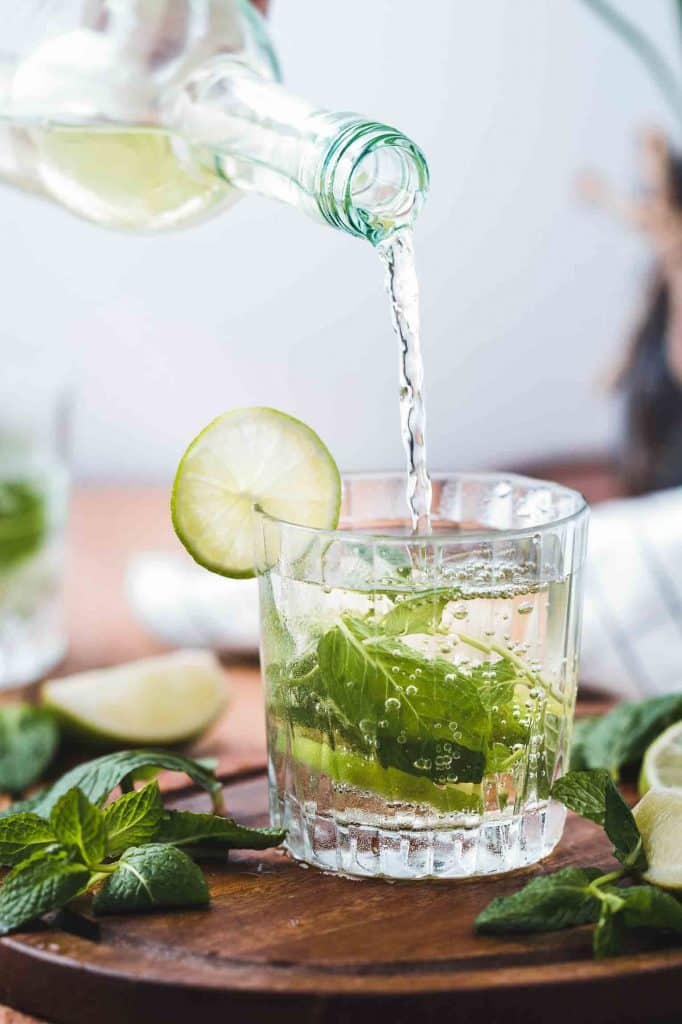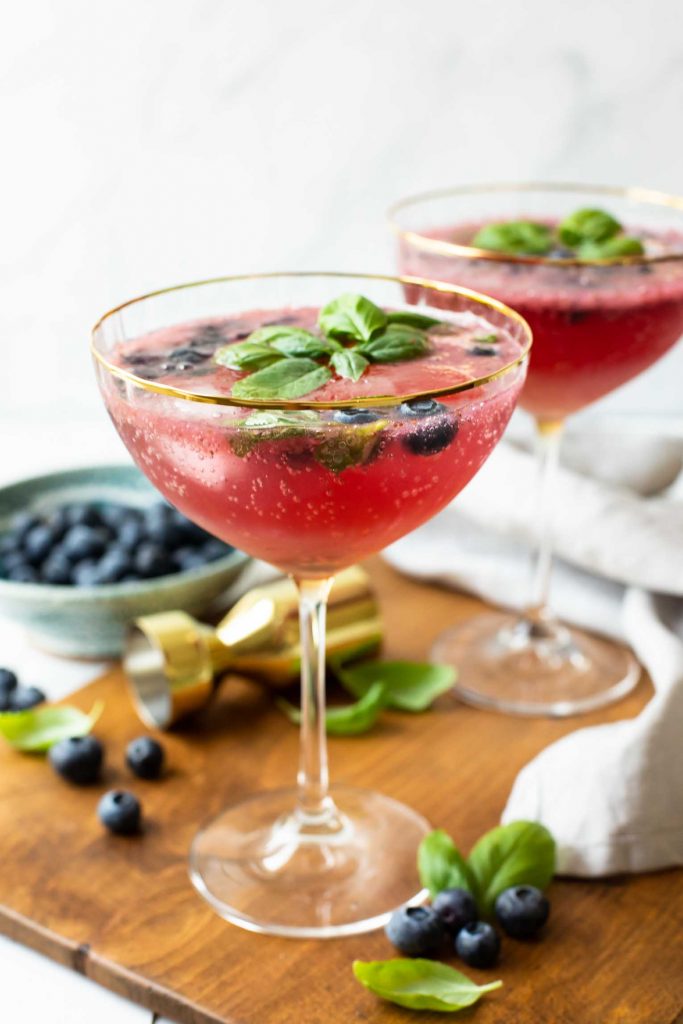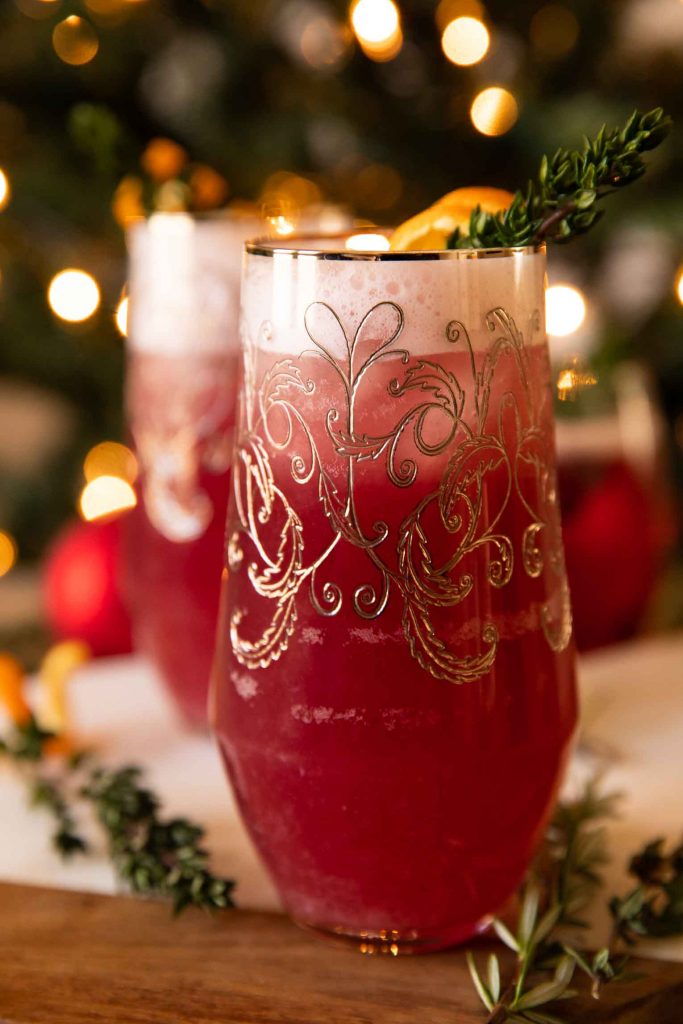
Gin and tonic is a classic cocktail that can always please a crowd. But does gin go bad? Here’s everything you need to know about how long gin lasts, how to store gin, and the different types of gin!
In This Article
- Does Gin Go Bad?
- How Long Does Gin Last After Opening It?
- What is Gin?
- How is Gin Made?
- How is Gin Different From Vodka?
- Are There Different Types of Gin?
- How Long Does Gin Last?
- How to Store Gin for Maximum Freshness
- Can You Keep Gin in the Freezer?
- How to Tell if Gin is Bad
- Cocktail Drinks with Gin
Does Gin Go Bad?
Interestingly, gin originated as a medicinal liquor made by monks and alchemists. Some historical reports say that gin’s core ingredient, juniper, has been combined with alcohol as far back as… 70 A.D. Now that’s a long time! So as you peruse cocktail recipes with gin while reading up on the history of this spirit, you may wonder, does gin go bad?
Basically, if you keep unopened gin away from sources of light and heat (like near a window or above your oven) then it’s going to be ok. Gin is liquor so it’s considered shelf-stable which means it can stay out on the counter, unrefrigerated, for extended periods, and you won’t get sick after consuming it. Hooray! Gin doesn’t go bad!
There are, however, some things to consider to maximize your drinking experience. So continue on to learn all about gin and how to create the optimal tasting experience for you.
RELATED: Does Tequila Go Bad?
How Long Does Gin Last After Opening It?
Well, technically it could last forever if you store it properly. Once your bottle of gin is open and it’s exposed to the air, the oxidation process starts. This means the flavor will change (get worse) over time. Most gin-drinking experts recommend finishing an opened bottle within a year before the taste begins to deteriorate.
What is Gin?
Ah, so glad you asked! Gin is a light-bodied distilled spirit made of cereal grains like corn, rye, barley, and wheat. This alcoholic drink gets its flavor from juniper berries, which is why it has a distinct pine taste. Interestingly, juniper berries must be included in the alcohol for it to qualify as gin. Beyond this essential ingredient giving it a unique taste, many distillers use their own botanical recipe comprised of various herbs, spices, fruits, and flowers.
How is Gin Made?
As with any spirit, gin is made by distilling a grain with juniper berries (and other botanical ingredients if making a flavored gin). Some gins are distilled multiple times which creates a smoother liquor. But overall the distillation process that creates an alcohol-like gin is essentially the same.
How is Gin Different From Vodka?
Gin and vodka are both neutral, light-colored (usually) spirits that can be distilled with various ingredients. There are many similarities. In fact, without the distinct juniper berry ingredient in gin, it’s technically vodka. The grain distillation process is the same. This means it’s possible to make your own gin at home using vodka and whatever botanical ingredients you want to infuse into your homemade spirit.
RELATED: The Best Vodka For A Moscow Mule
Are There Different Types of Gin?
Yes, there are many different types of gin. There’s no one way to make it and it can be distilled from a variety of things! There are 9 main types of gin:
London Dry Gin
This is the most common type of gin and likely the kind you see in liquor stores most often. As the name alludes, its origins are of old London. The distinct characteristic of this gin is that it has very little sugar. Many other types of gin compare their flavor and distillation process to London dry gin.
Plymouth Gin
If you don’t care for the juniper berry essence, this would be a great gin to try. It’s sweeter than the London dry gin and has a softer juniper taste. Plymouth gin is a popular base for gin and tonics because of its earthy and organic undertones.
Genever Gin
The fermentation process of genever gin creates a more malty gin than London dry. Which makes it a great option for people who like scotch!
Old Tom Gin
Old Tom gin is distilled twice (sometimes more) as opposed to once for London dry gin. It’s sweeter than London dry, too, because of added sugars, but drier than genever.
Japanese Gin
Japanese gin typically is made using fewer ingredients and uses Japanese native botanicals like sakura (cherry blossom), hinoki (Japanese cypress), gyokuro (a variety of green tea), sansh (indigenous peppercorn), and a variety of indigenous citrus fruit. This sounds like an interesting gin to try neat or in a mixed drink!
Sloe Gin
Sloe gin stands out with its red color derived from the plum-like fruit infused into the gin. This gin has a high sugar content and relatively low alcoholic volume so it’s technically a gin liqueur.
Barrel-aged Gin
Barrel-aged gin is a type of gin that has been, you guessed it, aged in a wooden barrel. This gives the distiller endless creative options to customize their gin using the type of wood to add flavor.
Navy strength Gin
Navy strength gin gets its name from a connection to the 18th century British Royal Navy and has a strong juniper taste with 57% ABV. The term “drink like a sailor” comes to mind here.
Contemporary Gin
A breakaway from the traditional juniper taste, contemporary gin sets itself apart with a variety of flavors with notes of pepper, florals, citrus, and earthy herbs.
How Long Does Gin Last?
It could potentially last forever, under the right conditions. As long as you have a high-quality bottle of unopened gin it can stay in your liquor cabinet for eternity – or at least until you crack open a bottle to make a fresh gin cocktail. Remember, gin doesn’t age once bottled, so it won’t do you any good to “let it sit” in hopes of making the spirit better.
Once you’ve opened the bottle, it’s best to drink the bottle within a year, as there are some things that may cause the gin to deteriorate. The gin won’t go bad, but the longer it’s stored opened, the worse its taste will be. That means that if you leave the bottle open for a few years, the gin might not taste that great and you will likely discard it. So if you’re rummaging through your liquor cabinet and find a dusty bottle of gin, best to toss it. Recycle the bottle and select a nice-looking new one from the liquor store.
RELATED: White Rum Vs. Dark Rum
How to store gin for maximum freshness
The most important storage tip is to keep the tightly sealed bottle in a cool and dry area, away from sunlight and any sources of heat. Sunlight and heat will cause the gin to evaporate (oh no!) and any trapped air will cause oxidation which will mess with the chemical makeup of the gin (and ruin the flavor.)
You can test this process yourself to see how sunlight, heat, and air affect the gin. Leave a glass with a small amount of gin overnight and taste it the next day. You’ll probably notice the taste changed, and not in a good way. You can test the same process by leaving a small amount of gin near the stove or a window and tasting it the next day.
Pro tip: If you opened a large bottle and don’t plan to drink it within a month, pour the gin into smaller bottles to reduce the amount of air in each, thus reducing the deterioration process. The more air in the bottle, even if it’s sealed, the faster the oxidation.
Can You Keep Gin in the Freezer?
Ohhh ice cold gin sounds delightful! Fortunately, it’s absolutely ok to keep gin in the freezer. In fact, some of the trendiest bars keep their gin in the freezer (and glasses) to create the iciest martinis and other cocktails without having to dilute it down with ice. Since typical freezers are set to 0℉, the gin won’t freeze unless temperatures fall below -17℉.
If you enjoy gin neat, you’ll love the freezer storage method. Freezer storage doesn’t affect the quality of the spirit, it’s more about maximizing the drinking experience.
How to Tell if Gin is Bad
If you have stored gin for a long time, it’s best to check its quality before making drinks or serving it to your guests. Pour some into a glass and look for any particles that shouldn’t be there. Then, smell the gin and ensure it smells like it should. If both of those things check out ok, give it a taste, and if it tastes ok then go ahead and imbibe. If you’re unsure of any of the factors, it’s probably best to discard the alcohol. Especially, if we’re talking about a bottle that’s been opened for quite some time!



[…] RELATED: Does Gin Go Bad? […]